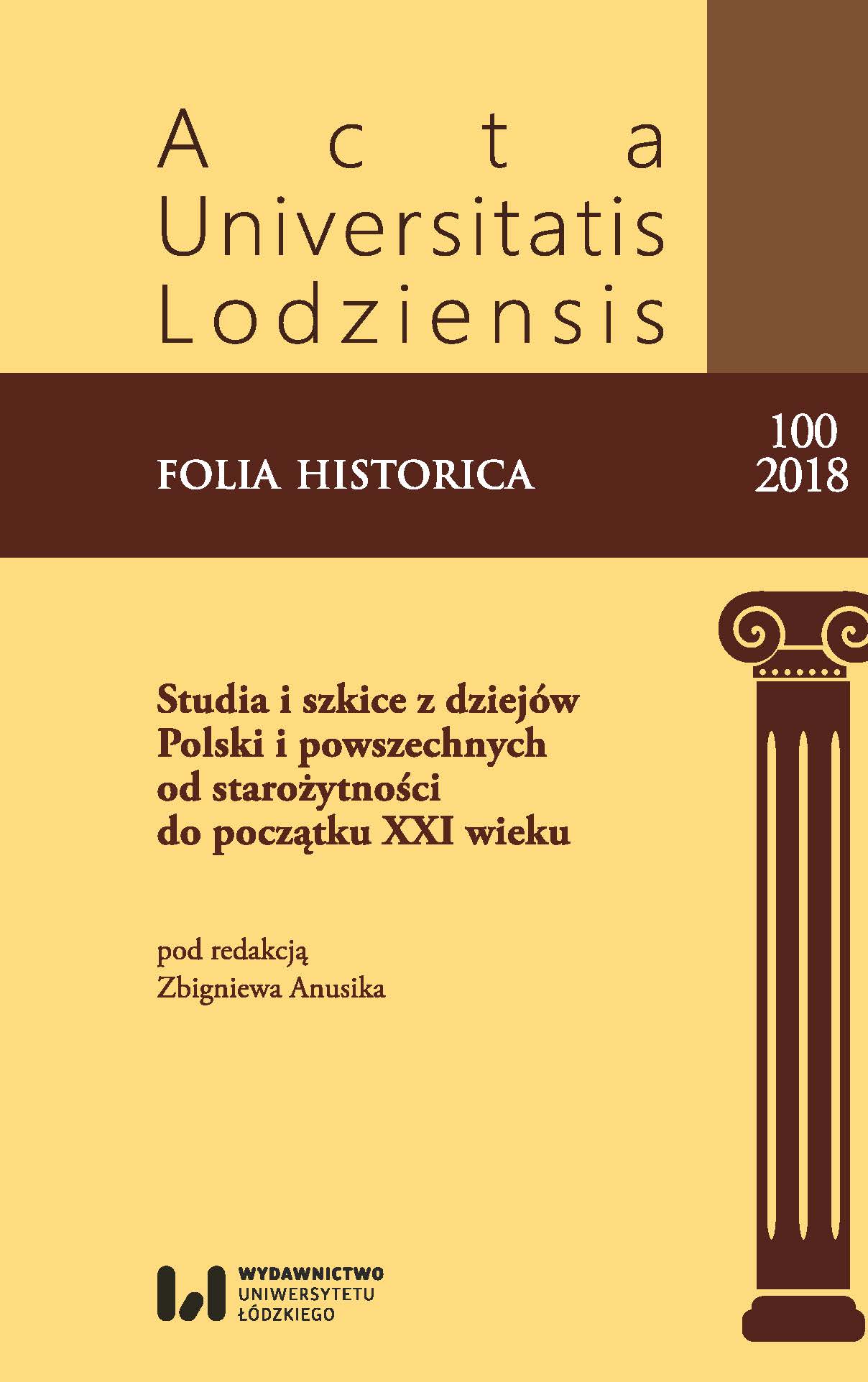Koniec zimnej wojny na południu Afryki. Sprawa Namibii podczas negocjacji między Stanami Zjednoczonymi a Związkiem Sowieckim (1987–1988)
DOI:
https://doi.org/10.18778/0208-6050.100.13Słowa kluczowe:
Namibia, niepodległość, negocjacje, konstruktywne porozumienie, szczytAbstrakt
Spośród wielu sporów istniejących między Stanami Zjednoczonymi a Związkiem Sowieckim w czasie zimnej wojny jednymi z trwających najdłużej była wojna o niepodległość Namibii i wojna domowa w Angoli, w literaturze traktowane niekiedy jako jeden konflikt, nazywany południowoafrykańską wojną o granice. Walka Namibijczyków o wolność trwała od 1966 r., jednak 20 lat później wciąż nie było widać perspektyw szybkiego zakończenia konfliktu. Przełom nastąpił w latach 1987–1988 dzięki seriom spotkań i negocjacji, jakie odbyły się między administracją prezydenta USA Ronalda Reagana i sekretarza generalnego KPZS Michaiła Gorbaczowa. Dla rozwiązania kwestii Namibii kluczowym rokiem był 1988 dzięki podpisaniu w Nowym Jorku grudniowych porozumień między władzami Angoli, Kuby i RPA. Rok później rozpoczęto realizację Rezolucji Rady Bezpieczeństwa ONZ nr 435, a wojska południowoafrykańskie zaczęły stopniowo opuszczać terytorium Namibii. Artykuł ma na celu wskazać najważniejsze aspekty negocjacji między USA i ZSRS w sprawie Namibii w latach 1987–1988, głównie przed szczytem i w czasie jego trwania (Moskwa, przełom maja i czerwca 1988 r.).
Pobrania
Bibliografia
Daily Report: Supplement. Soviet Union, 1 June 1988, Ronald Reagan Library, ref. code F1737. [U.S. Department of State Freedom of Information Act].
Google Scholar
Highlights of the Moscow Summit, 8 June 1988, Ronald Reagan Library, ref. code OA 18287. [U.S. Department of State Freedom of Information Act].
Google Scholar
Memorandum for the President: The Moscow Summit, May 1988, Ronald Reagan Library, ref. code 90440. [U.S. Department of State Freedom of Information Act].
Google Scholar
Memorandum of Conversation, The President’s first One-to-One meeting with General Secretary Gorbachev, 29 May 1988, Ronald Reagan Library, ref. code 90497. [U.S. Department of State Freedom of Information Act].
Google Scholar
Memorandum of Conversation. The Secretary’s Meeting with Shevardnadze, 14 April 1988, Ronald Reagan Library, ref. code 90450. [U.S. Department of State Freedom of Information Act].
Google Scholar
Resolution 626 of UN Security Council, 16 January 1988. [U.S. Department of State Freedom of Information Act].
Google Scholar
Nujoma S., Where Others Wavered, London, 2001.
Google Scholar
Shultz G., Memoirs – Cold War: Moscow (Reagan–Gorbachev) Summit, http://www.margaretthatcher.org/document/110619 (dostęp: 12 I 2018).
Google Scholar
Crocker C., High Noon in southern Africa, New York 1992.
Google Scholar
Dale R., The Namibian War of Independence 1966–1989. Diplomatic, Economic and Military Campaigns, Jefferson, 2014.
Google Scholar
Davies J.E., Constructive Engagement? Chester Crocker & American Policy in South Africa, Namibia & Angola 1981–8, Ohio 2007.
Google Scholar
Disengagement from Southwest Africa: Prospects for Peace in Angola and Namibia, ed. O.E. Kahn, Somerset 1991.
Google Scholar
Dreyer R., Namibia & Southern Africa: Regional Dynamics of Decolonization 1945–90, London 1994.
Google Scholar
Gaddis J.L., The United States and the End of the Cold War, Oxford 1992.
Google Scholar
George E., The Cuban Intervention in Angola, London–New York 2005.
Google Scholar
Gleijeses P., Visions of Freedom. Havana, Washington and Pretoria and the Struggle for Southern Africa 1976–1991, Chapel Hill 2013.
Google Scholar
Kanet R.E., Kolodziej E.A., Cold War as Cooperation: Superpower Cooperation in Regional Conflict Management, Baltimore 1991.
Google Scholar
Kukułka J., Historia współczesna stosunków międzynarodowych, Warszawa 1998.
Google Scholar
Namibia’s Foreign Relations. Historic contexts, current dimensions, and perspectives for the 21st Century, eds A. Bösl, A. du Pisani, D.U Zaire, Windhoek 2014.
Google Scholar
Oberdorfer D., From the Cold War to a New Era: The United States and the Soviet Union, 1983–1991, London 1998.
Google Scholar
Service R., The End of the Cold War 1985–1991, London 2015.
Google Scholar
St. Jorre J. de, Africa. Crisis of Confidence, „Foreign Affairs”, 1 III 1983, s. 675–691.
Google Scholar
Tsokodayi C.J., Namibia Independence Struggle. The Role of the United Nations, Bloomington 2011.
Google Scholar
Valenta J., Cibulka F., Gorbachev’s New Thinking and Third World Conflicts, Somerset 1990.
Google Scholar
Vanneman P., Soviet Strategy in Southern Africa: Gorbachev’s Pragmatic Approach, Stanford 1990.
Google Scholar
Wallace M., A History of Namibia, London 2011.
Google Scholar
Daniel J., The Impact of the Cold War and the Fall of the Berlin Wall on Southern Africa, http://www.kas.de/upload/Publikationen/Panorama/2009/1/daniel.pdf (dostęp: 30 I 2018).
Google Scholar
Hashimoto J., Cold War Chat: Chester Crocker, Former U.S. Assistant Secretary of State for African Affairs, https://web.archive.org/web/20060923171400/http://www.cnn.com/SPECIALS/cold.war/guides/debate/chats/crocker/ (dostęp: 12 I 2018).
Google Scholar
Summit Peace Gains Seen for Angola and Namibia, „Los Angeles Times”, 18 V 1988, http://articles. latimes.com/1988-05-18/news/mn-2967_1_summit-peace (dostęp: 12 I 2018).
Google Scholar
Pobrania
Opublikowane
Jak cytować
Numer
Dział
Licencja

Utwór dostępny jest na licencji Creative Commons Uznanie autorstwa – Użycie niekomercyjne – Bez utworów zależnych 4.0 Międzynarodowe.











